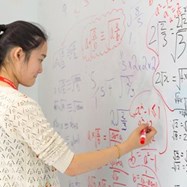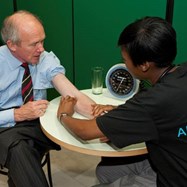GCSE Results 2013
22 August 2013
Commenting on this year’s GCSE results Dr Wendy Piatt, Director General of the Russell Group of Universities, said:
“We would like to congratulate all those pupils who have worked so hard for their GCSE grades. We hope those aspiring to go to a leading university will think carefully about the next steps and pick their A-level or equivalent subjects wisely.
“It is encouraging that entries in foreign languages have increased for a second year running but still only cause for muted celebrations. There is still a long way to go to get back to previous levels. If the UK is to engage fully with the wider world in business, diplomacy and academia then many more young people need to be studying languages. It is a real shame that so many students missed out on taking languages over the last decade and we hope today’s successful pupils will consider doing languages at A-level and beyond, where it is the right thing for them.
“We are also pleased to see an increase in the number of pupils taking single sciences with entries in all three subjects going up on top of sustained increases over the last five years. Pupils who take single science GCSEs are more likely to take STEM subjects at A-level.
“Whilst the increases in sciences and MFL are welcome we remain concerned about the gap between independent schools and some state schools when it comes to choosing these subjects and getting the top grades. Students in independent and grammar schools are not only much more likely to take sciences and languages, but they are also more likely to choose single science GCSEs. This is really important because students at state schools vastly increase their odds of getting a good grade in chemistry A-level if they’ve done the three single sciences at GCSE.
Choosing the right A-levels
“Young people should choose subjects which give them the best possible preparation for their chosen degree or which keep as many options as possible open for them, for example by taking facilitating subjects, such as English and maths.
“Too many pupils are still not getting the right advice and guidance. Pupils from families with less experience of higher education are in particular need of good information and advice from their schools and careers services. That’s why we published a guide called Informed Choices, which aims to improve information about how subject choices at school can impact on university applications.”
Notes to editors
- Entries for traditional languages (French, German, Spanish) are up 16.9% compared with last year. Entries for other modern languages rose by 5.1%. Figures from JCQ today show that entries for single sciences are up (biology are up 5.0%, chemistry 4.4% and physics 2.1%).
- The odds of getting an A or B at A-level chemistry in the maintained sector are increased by 76% for pupils who take three separate science GCSEs compared to those who took double science. Source: Science and Innovation Investment Framework 2004-2014: Next Steps (March 2006), p.47.
- The facilitating subjects at Advanced level are English literature, maths, physics, chemistry, biology, history, geography and modern and classical languages. These are subjects that are required more often than others by Russell Group universities. More details are available in Informed Choices.
-
Hamir Patel
hamir.patel@russellgroup.ac.uk
020 3816 1316
-
Hollie Chandler
Hollie.Chandler@russellgroup.ac.uk
020 3816 1307
 X
X


